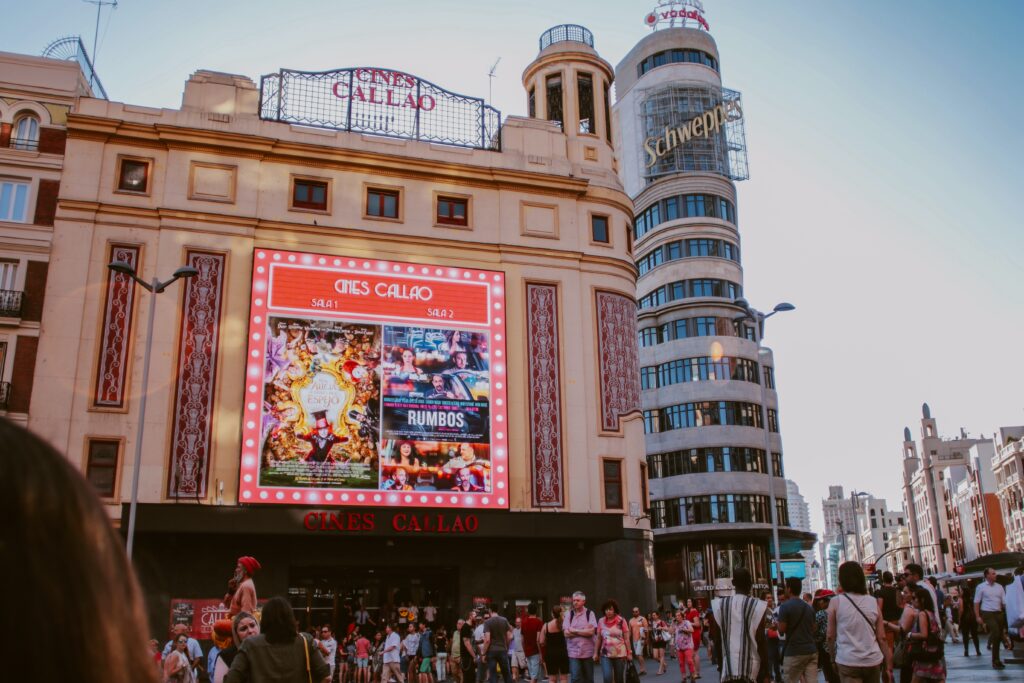First public film projection was in 1896 by Alexandre Promio, a french young man sent by the Lumiere brothers. This event was a total success and meant that the cineman had arrived to Spain and would become a business in the following years.
The first Spanish movie was made by Fructuós Gelabert in 1897, called Riña en un café. Other names in direction during the first years of Spanish films were Ricard e Baños and Segundo de Chomón who was focused in fantastic genre. During this time, Barcelona was the center of film art. In 1928 the first film club was created in Madrid where some intellectuals and artists used to gather, including the writer Federico García Lorca.

During the decade of 30s, the theme ‘costumbrismo’, an unique artistic style from Spanish literature, is used in the movies as part of the story line about social drama and local customs. A movie to mention directed by famous Luis Buñuelis is called Las Hurdes, a film focused on the poverty and misery suffered by the habitants of Las Hurdes. The film was censured by the government as they thought it would give a negative image of the country.
Due to the coup in 1936 staged by Francisco Franco, film production mostly stopped and the only type of films made were directly controlled by the dictatorship with a propagandist purpose, i.e. the documentary España 1936.
During the decades of 50’s the spanish movies get more influence from foreign movements such italian neorrealism. In 1953 San Sebastian Film Festival is created. Some popular movies from this period are Bienvenido Mr. Marshall, directed by famous director Luis García Berlanga, and it is a way to critize the exclusion of Spain from the american Marshall Plan; Nunca pasa nada (1963) where director Juan Antonio Bardem makes a criticism about the social situation in the country during that time.
In the 70’s decade, director Carlos Saura made some of his most important movies, with a noted opposition to the middle-class of that time, and to the regime which is reflected in the movie La prima Angelica. In this period, the dictatorship was trying to be more open and that explains the types of films being made were not censured and directors were able to present them in the international festivals.
At the end of 70’s decade and with the beginning of democracy state in Spain, the topics included in the films were various and the languages used as well, being finally allowed the dialogues in other regional language (i.e. Catalan).
If we think of a director that was revolutionary and changed the film art, this is Pedro Almodovar. His movies were and still are controversial, with a variety of topics treated in each movie (same sex relationships, feminism, religion, Franco’s regime…).
On the other hand,, another type of cinema called ‘El destape’ (stripping off) where the key element was the eroticism, had the end of the dictatorship as main reason for it.
For the first time in 1982 a Spanish movie was awarded at the Oscars with the Best Foreign Language Film, the tittle ‘Volver a empezar’ and directed by José Luis Garci. In 1985 the Arts and Film Academy is created, with the main goal to promote the Spanish cinema production.
During the end of past century and first years of 21st century, there were movies with new topics and about the contemporary society, but also there was a trend to make cinema focused in showing the past with a new perspective and with a new way to adapt popular literary works.
Some of the popular themes in the last years are those involved directly with common people and society in general, i.e. unemployment, immigration. The Spanish directors known internationally and more popular are Pedro Almodovar, J.J Bayona and Alejandro Amenabar.
In the last years, there are more women standing out as directors and producers, which makes a difference in the topics treated and gives a more diverse film culture. Some of them are Carla Simón, Isabel Coixet, Iciar Bollaín and Gracia Querejeta.